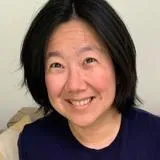Please note: this event has passed
You're warmly invited in-person or online to our inaugural lecture event series with our speaker from the Department of Engineering, Professor Elaine Chew.
The Inaugural Lecture Series from the Faculty of Natural, Mathematical & Engineering Sciences (NMES) celebrates the journeys and career successes of our professors, to provide insight and inspiration from the faculty's leading scientists.
Elaine a Professor of Engineering, will present on the ground-breaking research accomplished through her career. Afterwards, there will be a chance to raise a glass to her achievements over drinks at our reception.
Schedule:
- 16:45 - 17:00 Registration opens
- 17:00 - 17:05 Welcome/opening remarks: Professor Mark French, Interim Executive Dean of the Faculty of Natural, Mathematical & Engineering Sciences
- 17:05 - 17:50 (De-)constructing music for cardiac diagnostics and therapeutics by Professor Elaine Chew
- 17:50 - 17:55 Vote of thanks
- 17:55 - 18:00 Closing remarks: Professor Mark French, Interim Executive Dean of the Faculty of Natural, Mathematical & Engineering Sciences
- 18:00 - 19:00 Drinks reception
(De-)constructing music for cardiac diagnostics and therapeutics by Professor Elaine Chew
Music is ephemeral, its effects on the human body and mind are deep yet ineffable. This has led to many romantic notions about music's charm, especially its influence on the heart. Research to date has sought answers by dissecting this sublime phenomenon, uncovering the why and the how of music through mathematical representations and computational algorithms.
My research is looking at music’s physiological impact on the human body in particular on the heart. The similarities between music and heart signals mean that music information research techniques can be used to represent and categorise cardiac signals. Additionally, music expressivity can be linked to cardiovascular measures and use to modulate autonomic response. Leveraging computational and musical thinking, my research aims to further arrhythmia diagnostics and cardiovascular therapies.
Alongside an exploration of my research, this presentation will also cover my personal research journey spanning art, science, and medicine, and include musical illustrations and technology demonstrations at a Yamaha Disklavier piano.

Speaker bio:
Elaine Chew is a Professor of Engineering in the Department of Engineering and School of Biomedical Engineering & Imaging Sciences at King’s College London. An operations researcher and pianist, Elaine received a Bachelor of Arts and Sciences in Mathematical and Computational Sciences (Honors) and Music Performance (Distinction) at Stanford University, and Master's and PhD in Operations Research at the Massachusetts Institute of Technology (MIT) where she proposed the spiral array model. Prior to joining King's she was a senior researcher at the STMS Lab (IRCAM) in Paris 2019-2022, Professor of Digital Media at QMUL 2011-2019, and Assistant then tenured Associate Professor at USC in Los Angeles 2001-2011.
A pioneering music information researcher, she is forging new pathways between music and cardiovascular science. She is Principal Investigator for two ERC projects: COSMOS, which aims to use citizen data science to probe music structures created in performance; and HEART.FM, dedicated to building tools to study how these structures affect cardiac response. Her work has been recognised by the European Research Council, Presidential Early Career Awards for Scientists and Engineers, National Science Foundation Faculty Early Career Development Program (CAREER), and Radcliffe Institute for Advanced Study at Harvard.
Disclaimer: For in-person events we operate a policy of overbooking, given drop-out rates. Please ensure you arrive in good time to avoid disappointment on the day.
Livestream:
- This event will be livestreamed from 17:00 to 18:00 and a recording will be shared on the NMES Faculty YouTube channel.
- You will receive the livestream link closer to the event.
Photography and videography: The event you will be attending will have photography and videography. If you do not wish to appear in any recordings or photographs, please approach our registration team on the day of the event or email nmes-events@kcl.ac.uk before the event. Photographs and recordings taken may feature in our publications or on the King’s website and social media channels. All personal data will be processed in accordance with King’s privacy policy available on request or at www.kcl.ac.uk/terms/privacy
Privacy notice:
We collect and process your personal information to help us manage and run the event. In accordance with the King’s College London Data Retention Schedule, we will keep your information until the completion of the event. To find out more about how the university deals with your personal information, including your rights, please see the university’s core privacy notice. Your personal information will be transferred to the United States via Eventbrite. Please read the article where you can find out more on how Eventbrite protects your data.
Event details
Great Hall, Strand CampusStrand Campus
Strand, London, WC2R 2LS

